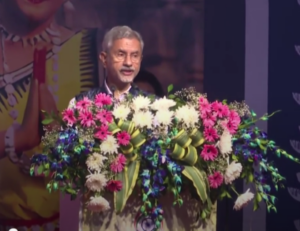The Genome India Project: A Historic Milestone in Biotechnology and Healthcare

Prime Minister Narendra Modi recently hailed the completion of the Genome India Project as a monumental achievement in the field of biotechnology. Launched with the vision of creating a comprehensive genetic database for India, the project is set to revolutionize healthcare, genetics, and policymaking in the country. With the sequencing of 10,000 genomes from diverse populations, this initiative is not just a technological breakthrough but a significant step toward understanding and addressing the unique health challenges faced by India.
What is the Genome India Project (GIP)?
The Genome India Project (GIP) is a pioneering national initiative aimed at creating a genetic resource that reflects the vast diversity of India’s population. The project, funded by the Department of Biotechnology (DBT), Government of India, was launched in January 2020. Its main objective is to sequence 10,000 genomes of healthy individuals from different regions, ethnic groups, and communities across the country. This data will help build a detailed genetic catalogue, which will serve as a reference point for understanding the country’s unique genetic landscape.
India is home to one of the world’s most genetically diverse populations, with numerous ethnic groups, languages, and cultural practices. This genetic diversity plays a significant role in how diseases manifest and how individuals respond to treatments. By sequencing the genomes of 10,000 individuals, the GIP aims to create a valuable resource that can be accessed by researchers and scientists to study the genetic variations within the Indian population.
Key Features of the Genome India Project
- Genomic Sequencing of 10,000 Individuals: The core of the Genome India Project involves the sequencing of 10,000 genomes from diverse populations across India. These genomes will be stored at the Indian Biological Data Centre, a crucial step in creating a national genetic resource.
- A Deep Understanding of India’s Genetic Diversity: The project seeks to map the genetic variations that exist across India’s population. This data will help in understanding how genetic factors influence health outcomes, diseases, and responses to treatments, leading to more tailored healthcare solutions.
- Precision Medicine and Public Health: The insights gained from the Genome India Project have the potential to revolutionize public health by enabling precision medicine. This approach tailors medical treatment based on an individual’s genetic makeup, ensuring that therapies are more effective and minimizing adverse effects.
- Supporting Policy and Healthcare Innovation: The genomic data gathered through this project will play a pivotal role in shaping policies related to healthcare, disease prevention, and treatment. It will also foster innovation in biotechnology, supporting India’s growing bioeconomy.
- National Focus on Specific Health Challenges: One of the important outcomes of this project will be addressing region-specific health challenges. For example, sickle cell anemia is a significant health issue among tribal communities. By understanding the genetic factors that contribute to this condition, the government can design targeted healthcare interventions.
- Fostering Global Competitiveness: By making this data accessible to researchers and scientists, the Genome India Project will enhance India’s position as a global leader in biotechnology. It will also contribute to the development of new therapeutic approaches and biotechnological innovations that could have far-reaching benefits for healthcare worldwide.
PM Modi’s Vision for Biotechnology and the Bioeconomy
Prime Minister Modi emphasized the transformative potential of the Genome India Project, highlighting that it is a critical step toward India’s biotechnology revolution. He also pointed out that India’s bioeconomy, which has seen remarkable growth over the last decade, will benefit significantly from the project.
India’s bioeconomy has grown from a valuation of $10 billion in 2014 to over $150 billion today. The combination of biotechnology and biomass is seen as a key pillar in India’s development, promoting sustainable growth and generating employment opportunities. The Genome India Project will further accelerate this bioeconomic growth by providing the tools and resources needed for innovation.
Healthcare and Policy Implications
In addition to its scientific and technological advancements, the Genome India Project holds immense promise for India’s healthcare system. The insights gained from the genetic data will help in the development of more effective public health policies. By understanding the genetic variations in different populations, policymakers can design interventions that are more aligned with the specific needs of various communities. For instance, addressing diseases like sickle cell anemia that disproportionately affect tribal populations will become more feasible with the genomic data generated by the project.
Moreover, the data from the Genome India Project will support the development of precision medicine, a revolutionary approach to healthcare that tailors treatments based on an individual’s genetic profile. This will lead to more personalized and effective treatments, especially in a country as diverse as India, where one-size-fits-all solutions often fall short.
Conclusion
The completion of the Genome India Project marks a historic moment for biotechnology and healthcare in India. With its vast genetic diversity, India is uniquely positioned to benefit from this initiative, which will pave the way for innovative healthcare solutions, more accurate disease prevention strategies, and a thriving biotechnology sector. As PM Modi pointed out, this project will not only enhance India’s bioeconomy but also empower the country to tackle its most pressing health challenges with precision and foresight. The Genome India Project is a milestone that promises to shape the future of public health and medical research in India for years to come.








